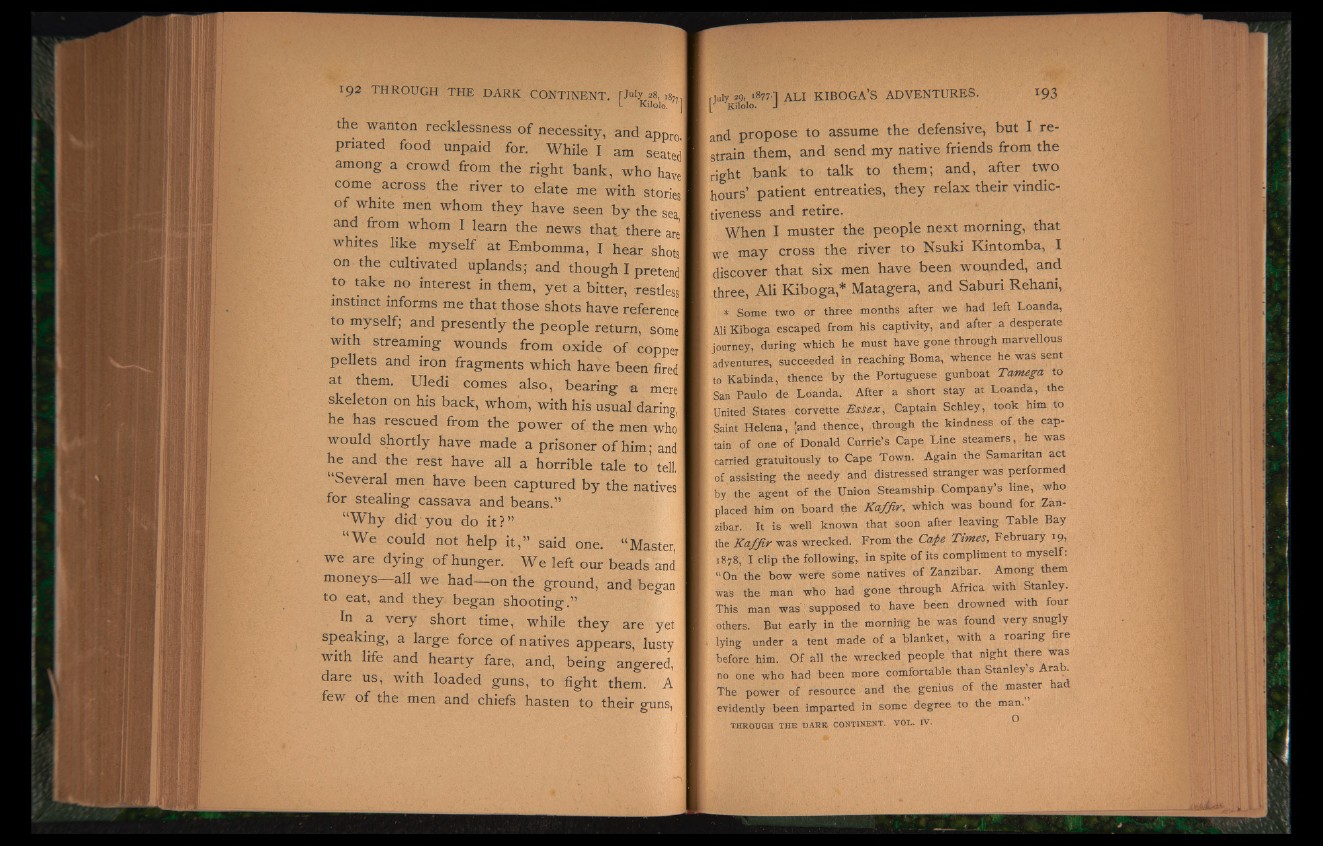
the wanton recklessness of necessity, and appro.
pnated food unpaid for. While I am seated
among a crowd from the right bank, who have!
come across the river to elate me with stories |
of white men whom they have seen by the sea
and from whom I learn the news that there are
whites like myself at Embomma, I hear shots
on the cultivated uplands; and though I pretend
to take no interest in them, yet a bitter, restless
instinct informs me that those shots have reference
to myself; and presently the people return, some
with streaming wounds from oxide of copper
pellets and iron fragments which have been fired
at them. Uledi comes also, bearing a mere
skeleton on his back, whom, with his usual daring,
he has rescued from the power of the men who |
would shortly have made a prisoner of him; and
he and the rest have all a horrible tale to tell, I
Several men have been captured by the natives I
for stealing cassava and beans.”
“Why did you do it?”
“We could not kelp it,” said one. “Master,
we are dying of hunger. We left our beads and ]
moneys all we had— on the ground, and began
to eat, and they began shooting.”
In a very short time, while they are yet \
speaking, a large force of natives appears, lusty
with life and hearty fare, and, being angered,
dare us, with loaded guns, to fight them. A
few of the men and chiefs hasten to their guns,
rTuly 29, 1877-1 ALI KIBOGA’S ADVENTURES.
Kilolo. J
| and propose to assume the defensive, but I restrain
them, and send my native friends from the
| dght bank to talk to them; and, after two
hours’ patient entreaties, they relax their vindictiveness
and retire.
When I muster the people next morning, that
we may cross the river to Nsuki Kintomba, I
discover that six men have been wounded, and
three, Ali Kiboga,* Matagera, and Saburi Rehani,
* Some two or three months after we had left Loanda,
Ali Kiboga escaped from his captivity, and after a desperate
journey, during which he must have gone through marvellous
adventures, succeeded in reaching Boma, whence he was sent
to Kabinda, thence by the Portuguese gunboat Tamega to
San Paulo de Loanda. After a short stay at Loanda, the
United States corvette Essex, Captain Schley, took him to
Saint Helena, [and thence, through the kindness of the captain
of one of Donald Currie’s Cape Line steamers, he was
carried gratuitously to Cape Town. Again the Samaritan act
of assisting the needy and distressed stranger was performed,
by t h e agent of the Union S t e a m s h i p Company’s line, who
placed him on board the Kaffir, which was bound for Zanzibar.
It is well known that soon after leaving Table Bay
the Kaffir was wrecked. From the Cape Times, February 19,
1878, I clip the following, in spite of its compliment to myself:
“On the bow were Some natives of Zanzibar. Among them
was the man who had gone through Africa with Stanley.
This man was supposed to have been drowned with four
others. But early in the mornifig he was found very snugly
lying under a tent made of a blanket, with a roaring fire
before him. Of all the wrecked people that night there was
no one who had been more comfortable than Stanley’s Arab.
The power of resource and the genius of the master had
evidently been imparted in some degree to the man.
THROUGH THE DARK CONTINENT. VOL. IV.